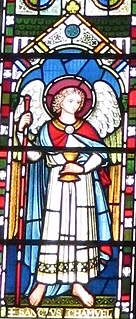 W
WAn archangel is an angel of high rank. The word "archangel" itself is usually associated with the Abrahamic religions, but beings that are very similar to archangels are found in a number of religious traditions.
 W
WAzrael is the Angel of Death in Islam and some Jewish traditions, and is referenced in Sikhism.
 W
WBarachiel is one of the seven Archangels in Byzantine Catholic and Eastern Orthodox tradition.
 W
WCamael, also spelled Khamuel, Camiel, Cameel and Camniel, is the Archangel of strength, courage and war in Christian and Jewish mythology and angelology.
 W
WIn the Abrahamic religions, Gabriel is an archangel, first described in the Hebrew Bible.
 W
WSaint Jegudiel the Archangel also Jhudiel or Jehudiel is one of the seven Archangels in Eastern Orthodox tradition and in the eastern rites of the Catholic Church.
 W
WThe Hebrew name Jerahmeel, which appears several times in the Tanakh, also appears in various forms as the name of an archangel in books of the intertestamental and early Christian periods.
 W
WThe angel Jophiel, also called Iophiel, Iofiel, Jofiel, Yofiel, Youfiel, Zophiel and Zuriel, is a non-canonical archangel of wisdom, understanding, and judgment. He is listed as one of the Seven Archangels in Pseudo-Dionysian teachings.
 W
WMetatron or Mattatron is an angel in Judeo-Islamic and Christian mysticist mythology mentioned in a few brief passages in the Aggadah and in mystical Kabbalistic texts within the Rabbinic literature. The figure forms one of the traces for the presence of dualist proclivities in the otherwise monotheistic visions of both the Tanakh and later Christian doctrine. The name Metatron is not mentioned in the Torah and how the name originated is a matter of debate. In Islamic tradition, he is also known as Mīṭaṭrūn, the angel of the veil. In folkloristic tradition, he is the highest of the angels and serves as the celestial scribe or "recording angel".
 W
WPhanuel is the name given to the fourth angel who stands before God in the Book of Enoch, after the angels Michael, Raphael, and Gabriel. Other spellings of Phanuel include Paniel, Peniel, Penuel, Fanuel, Orfiel, and Orphiel. His name means "the face of God".
 W
WRaphael is an archangel responsible for healing in the traditions of most Abrahamic religions. Not all branches of these religions consider the identification of Raphael to be canonical.
 W
WIn kabbalistic and Christian angelology, Sachiel is an archangel of the order of cherubim. The meaning of his name is given as "the covering of God". The name 'Sachiel' originally occurs in the late 1500s grimoire called The Heptameron.
 W
WSamael is an archangel in Talmudic and post-Talmudic lore; a figure who is the accuser (Ha-Satan), seducer, and destroyer (Mashhit).
 W
WSan La Muerte is a skeletal folk saint that is venerated in Paraguay, Argentina and southern Brazil. As the result of internal migration in Argentina since the 1960s the veneration of San La Muerte has been extended to Greater Buenos Aires and the national prison system as well.
 W
WSandalphon is an archangel in Jewish and Christian writings. Sandalphon figures prominently in the mystical literary traditions of Rabbinic Judaism and early Christianity, notably in the Midrash, Talmud, and Kabbalah.
 W
WSaint Selaphiel the Archangel or Saint Sealtiel, Selatiel, sometimes identified with Salathiel from the Second Book of Esdras. He is one of the seven archangels in the Byzantine Catholic and Eastern Orthodox traditions.
 W
WThe concept of Seven Archangels is found in some works of early Jewish literature.
 W
WThe Sopó Archangels is a famous collection of oil paintings from the Colombian colonial period which is located in the Church of the Divine Savior in the Colombian municipality of Sopó.
 W
WThe Book of Giants is an apocryphal Jewish book which expands the primeval creation to end of time narrative of the Hebrew Bible and, by its multifaceted elaborations on divine decrees of warning and doom, ties the ancient prophet Enoch closer to his generally recognized 'storyline' than does even the story's principal treatise of 1 Enoch. Together with 1 Enoch's Book of Watchers, as Enochian scholar James C. VanderKam maintains, "it stands as an attempt to explain how it was that wickedness had become so widespread and muscular before the flood; in so doing, it also supplies the reason why God was more than justified in sending that flood." The Giants discovery at Qumran dates the text's creation to before the 2nd century BC.
 W
WUriel ; or Ouriel is the name of one of the archangels who is mentioned in the monotheist post-exilic rabbinic tradition and of certain Christian traditions. He is well known in the Russian Orthodox tradition and recognized in the Anglican Church as the 4th archangel. He is also well known in European esoteric medieval literature.
 W
WZadkiel is the archangel of freedom, benevolence and mercy, and the Patron Angel of all who forgive, also known as Sachiel, Zedekiel, Zadakiel, Tzadkiel, and Zedekul. Rabbinical tradition considers him to be the angel of mercy.
 W
WZaphkiel, also written as Tzaphqiel,Tzaphkiel, Zafkiel, Zafchial, Zaphchial, Zaphiel, or Zelel, is an archangel. His name means "God's knowledge". He is sometimes equated with Jophiel/Zophiel, but other times considered to be a different angel. Zaphkiel is "chief of the order of thrones and one of the 9 angels that rule Heaven; also one of the 7 archangels." He can watch people when they need to make important decisions and when they need to put them into words for others. If they are unsure of the words, he will help them to make the message more clear. The leader of the Erelim, he is associated with the planet Saturn. It is associated also with the Sephirot Binah (Kabbalah).